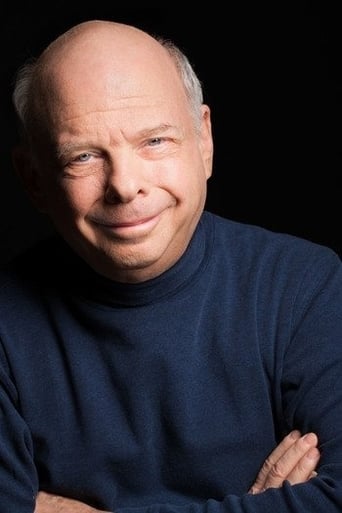Chris Knipp
Alex Olch, who is only 28 and a clothing (necktie) designer and columnist as well as director, has made his first feature-length film, a documentary, using unfinished film footage shot by his late mentor and friend Richard P. Rogers, former director of the Film Study Center at Harvard, and incorporating that into a dramatization of the latter's life, with Wallace Shawn and Bob Balaban as occasional actors. Olch and Rogers, who became friends and remained so till the latter's death in 2001, had much in common. As a NYTimes article by Lily Koppel explains, "Mr. Olch and Mr. Rogers attended exclusive Manhattan private schools, graduated from Harvard, shared a love of film and neckties and grew up in adjacent buildings on East 74th Street. As adults, they lived on the same block on Mott Street. At a similar age, their faces even look startlingly alike, both with eyes like cameras, each with rusty hair." Besides, Wallace Shawn knew Rogers "from the sandbox" and shared a similar privileged preppy (Dalton School) existence. The incestuous nature of the production continues with Olch's working side by side with Rogers' widow Susan Meiselas in her studio, with her producing the film and he directing. In the film, Meiselas is (briefly) played by Cynthia Nixon, who plays Miranda in "Sex and the City." Olch described himself as working in "a strange zone between fiction and nonfiction" in making his film.This project crept up on Olch, whose main interest is in fiction films. After Rogers died of cancer, the young man left a note under the door of the Mott Street loft for Meiselas (a well known Magnum photographer), who was off on assignment, saying he hoped everything was okay. She said she could use some help organizing her late husband's films. This involved reviving his old editing machine, and sorting through some forty or more years of footage, material for an autobiography on film that Rogers, who made 18 films, could never bring to fruition. One thing led to another. In his own way, Olch completed Rogers' autobiographical film. That's what 'The Windmill Movie' is. It's a Shandian ramble that looks at old Super 8 film made by Rogers' father, shows Shawn impersonating Rogers, Rogers' mother sitting out on the lawn in summer in a mink coat, and films of various girlfriends, lawn parties and tennis matches in the Hamptons, and plane flights to exotic Latin American places. Rogers only married Meiselas when he was about to die, after thirty years together, and had no children--one of his regrets. Just as 'Tristram Shandy' is about the stops and starts in telling its hero's life, 'The Windmill Movie' is about the impossibility of Roger's doing his autobiography on film--of ever finishing this lifelong project. The seamless editing is instinctive or "subconscious" in its decisions rather than logical, as was, Olch says, his choice of music, which includes a recurrent passage by Schubert played on the piano by Robert Humphreville. Olch skirts the edge between fiction and non-fiction in his credits, which denote the film as "Inspired by the unfinished work of Richard P. Rogers." The windmill adjoined the tennis courts in Wainstcott, in the Hamptons, where Rogers grew up in the summers and inherited a house. In going back to the windmill in his title, Olch follows Rogers, whose original aim was to make a fim about the place, rather than just about himself. Often addressing the camera--or in voiceovers read by Olch from Rogers' writings--he talks about the world of wealth and privilege, or being "too rich and too white," that Rogers worries will make his complaints--of being dissatisfied, unhappy, unfulfilled, always less than others--sound spoiled and annoying.Rogers' family was dysfunctional, or as his mother says, "nutty"; immediate relatives all went astray in some way. Wainscott society was alcoholic. The film tells much about confusion and discontent and little about Rogers' palpable successes, the teaching at Harvard, where he was admired and influential, the documentaries and films for PBS that were tidy and well made and won awards. He is not only discontented, but discontented with being discontented. At one point he says all he can do is make conversation and play tennis. Rogers' mother was antisemitic and when he brought Meiselas to visit, she would up by driving them both out of the house. He vowed never to go back to Wainscott. But in the press conference Meisela indicated that she now owns the house which he later inherited, and keeps it in memory of him.In the end there is little of Wally Shawn; this is an exploration that includes its false starts, because Olch thought a fictive or acted element would be important but it turned out not to be. The fascination of the whole film is how it moves in crabwise, by fits and starts, by a gradual accumulation eventually providing a clear picture of, well, almost, something like, what it was like to be this warm, humorous, self-deprecating, somewhat unhappy man.Shown as part of the NYFF, along with Dick Rogers' Sixties first film 'Quarry,' a black and white short made near Quincy, Massachusetts with beautifully composed rocky landscapes and shots of young people worth of Robert Frank's 'The Americans.' Documentary has not always seemed to be the NYFF's strong point, but this one has the undeniable strength of being sui generis and unusually thought-provoking, a wise marriage of artist and subject.

